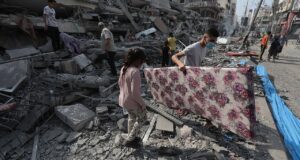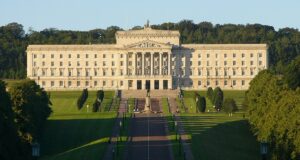Guest Contributor: Paul Iddon
While the United States administration has been successful in establishing a multinational coalition to fight the Islamic State (IS) it to date has yet to devise a clever strategy for doing so. Using its cutting edge technology to deliver the fight to an irregular Islamist group through bombing runs and cruise missile attacks clearly is no way to defeat IS. And the administration admits as much. The brunt of the fighting on the ground against IS is still being endured by the Kurds. And not just the Kurds of Northern Iraq, but the Kurds of Syria also.
The Syrian Kurdish region is known as ‘Rojava’ which in English means ‘west’ denoting that the Syrian Kurdish region is the western part of a broader regional Kurdish nation stretching from eastern Syria across parts of the polities of Turkey, Iraq and Iran. There an umbrella organization called the Kurdish Supreme Committee (KSC) governs that now autonomous region. They have been fighting IS for some time now and have maintained a de-facto truce with Damascus which evacuated its troops from the area early on in the uprising against the Assad regime. Under that umbrella government Syria’s Kurds have established the what are called “People’s Protection Units” (YPG). As is the case with the Peshmerga in neighbouring Iraq their primary function is to protect the Kurdish region of Syria.
Here’s the thing. Within the KSC is the political entity the Democratic Union Party (PYD). The PYD has affiliations with the PKK (Kurdistan Workers Party) which the United States considers a terrorist organization. This affiliation no doubt means Washington is at the very least lukewarm about establishing any kind of alliance or coordination with Syria’s Kurds. Nevertheless the KSC of which the PYD is an integral part also consists of the Kurdish National Council, a political organization whose foundation in 2011 was sponsored by America’s ally Iraqi Kurdistan’s President Massoud Barzani. With seemingly no direct contact or coordination with these ground forces fighting IS the air strikes the United States and its allies has been launching against irregular IS forces, who are continuing to fire upon and besiege the Kurdish town of Kobani near the Turkish border, are showing how limited air power alone is proving to be when it comes to halting that groups advances.
Rojava is under siege. Even though the United States may have its reservations about the KSC the administration should nevertheless seriously contemplate its options there. While there has been talk about training moderate rebels to form a new Syrian ground force – that also opposes Assad’s continued rule – which the U.S.-led coalition can coordinate operations against IS with the fact of the matter is that on the ground at this point in time the Kurds are the only well organized group whose territory is no longer under the control or under attack from the Syrian regime and who have an armed force that is actively fighting IS. Or put another way, an active force that are not affiliated with the Syrian regime (which the United States is quite rightfully not aligning itself with in this fight) and are fighting IS and sacrificing their lives in order to protect their homeland. And with it, by extension, a region which has at least the potential to become a stable haven for refugees and displaced whom could be shielded from IS attack and even in the future safe from regime attack if the U.S.-led coalition maintains a protective aerial umbrella over it and gives these Kurds a fighting chance.
If the administration is serious about implementing a strategy to combat this Islamist foe it has to be serious about evaluating its options regarding any potential of directly cooperating defensive operations with the indigenous ground forces who are dying everyday defending their homeland against IS. Have them be the coalitions eyes-and-ears in that area in other words.
Since June of this year when IS managed to overrun large swaths of Iraq, due to the ineptness of the Iraqi government, the Iraqi Kurds were the ones who bravely stood up to them with very limited means wherever they could. Similarly in Syria the Kurds there stand in the way of IS and are valiant in their fight against it. Given this reality on the ground is it right that the U.S. and the multinational coalition it is leading in the fight against IS continue to simply launch tit-for-tat strikes in lieu of exploring at least temporary strategy of coordination and at least ad-hoc cooperation with these forces?
Not seriously exploring options here at such a crucial moment would be tantamount to doing next to nothing. Nothing was done when the Kurds were under attack and under siege before. Nothing was done when, for example, the Shah of Iran decided to pull the rug from under Iraq’s Kurds in 1975 after he and the then U.S. administration of Gerald Ford sponsored and encouraged an armed Kurdish campaign against the nascent Baathist government in Baghdad (if the campaign succeeded, Barzani said at the time, Iraq’s Kurdish region was “ready to become the 51st state” of the United States) and opt for a deal with then Vice President Saddam Hussein.
Furthermore nothing was done when the Kurds for most of the 1980’s were gassed in their thousands. Eventually after the 1991 Persian Gulf War the U.S.-led coalition (after shamefully allowing Saddam’s Republican Guards to use some remaining helicopters after the February 28th ceasefire which they instantly used as part of a campaign to put down simultaneous Shia and Kurdish revolts, which would likely have ended his rule then and there if supported, because the ‘realist’-minded elements of the George H.W. Bush administration deemed a weakened Saddam left in power to be a force for stability) did establish no-fly zones over north and south Iraq.
Today in Syria Kurdistan we conscious witnesses to what could very well devolve into a massacre of Syria’s Kurdish population at the hands of the stated foes of the multinational coalition. If it is to do nothing substantial to work with these Kurds and help them survive and stand a fighting chance against the IS foe then the world will have turned its back on the Kurds once again. This time while they were wantonly slaughtered by the worst form of reactionary violence that volatile region has seen for some time.
Paul Iddon is a freelance journalist and writer. His main areas of interest are Middle Eastern affairs, politics and history.
Disclaimer: The views expressed in the article are the sole responsibility of the author and do not necessarily reflect the views of the Human Security Centre.
 Human Security Centre Human Rights and International Security Research
Human Security Centre Human Rights and International Security Research



